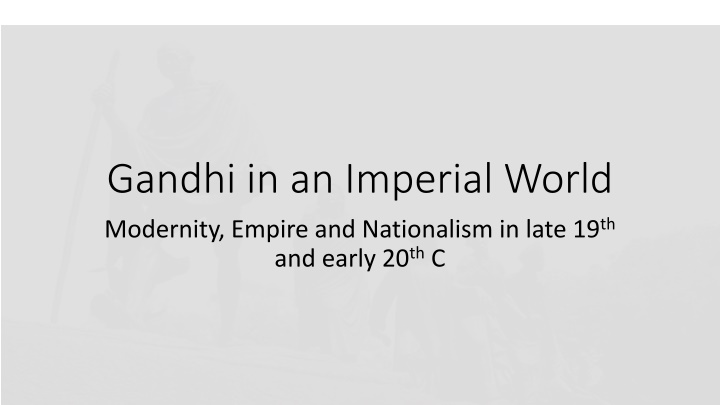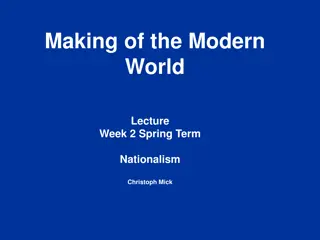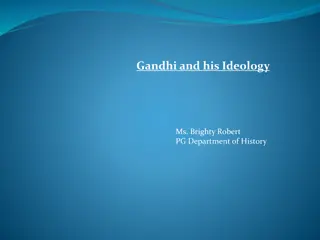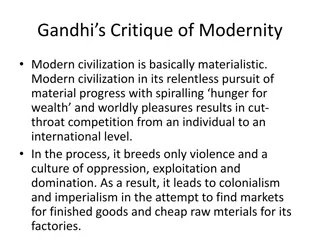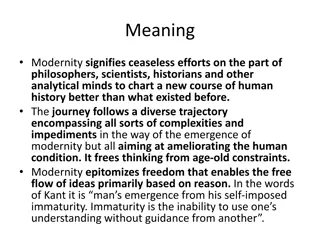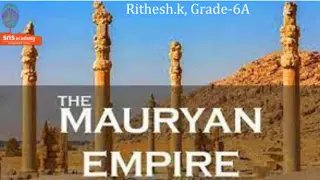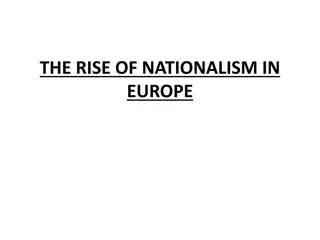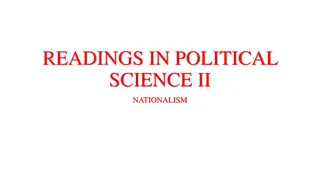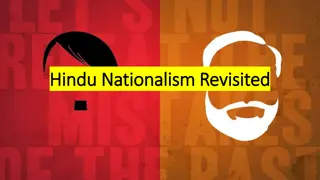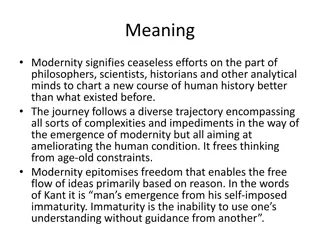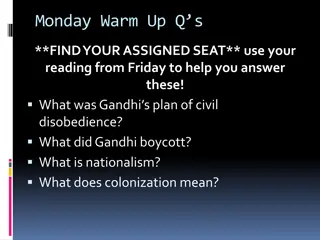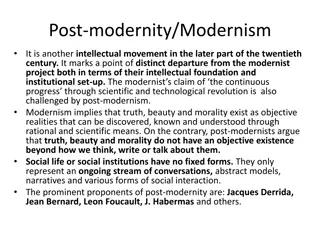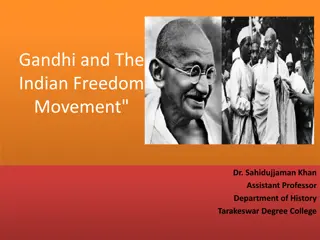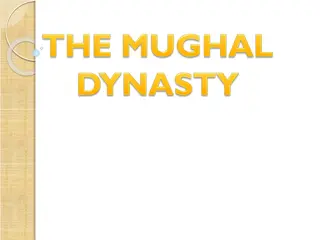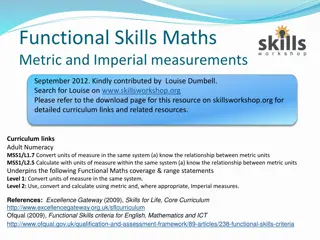Gandhi in an Imperial World: Modernity, Empire, and Nationalism
European colonizers spread the ideas of nationalism and imperialism, impacting Gandhi's response to modernity. Explore the complexities and challenges of challenging colonial modernity.
Download Presentation

Please find below an Image/Link to download the presentation.
The content on the website is provided AS IS for your information and personal use only. It may not be sold, licensed, or shared on other websites without obtaining consent from the author.If you encounter any issues during the download, it is possible that the publisher has removed the file from their server.
You are allowed to download the files provided on this website for personal or commercial use, subject to the condition that they are used lawfully. All files are the property of their respective owners.
The content on the website is provided AS IS for your information and personal use only. It may not be sold, licensed, or shared on other websites without obtaining consent from the author.
E N D
Presentation Transcript
Gandhi in an Imperial World Modernity, Empire and Nationalism in late 19th and early 20thC
Plan Use today s lecture to go back over some themes about Nationalism and Imperialism Focus on Gandhi, because it is the subject of your fourth PSA Lecture will then move to examining Gandhi in the context of a GLOBAL modernity discussed in chapters 18 and 19 Spelling: spelt G-A-N-D-H-I and not GHANDI! What is modernity and what made it global Plusses and Minuses of Modernity; who benefits and who does not; ambiguity toward modernity in the colonized world and difficulties of challenging it! Gandhi and a dialog with modernity Context Ideas in Hind Swaraj Limitations Modernity and other anti-colonial movements
Housekeeping Deadline for group formation for final presentation is now THURSDAY April 6 We will assign EACH student to a random group Working with random groups will be more difficult for you, logistically and intellectually Random groups will be held to the SAME STANDARDS as self-selected groups Therefore, FORM GROUPS and decide on topics/themes ASAP Btw, there will be no assigned peer review groups for the final presentations
Background Do look over the powerpoint on Nationalism and Imperialism Revisited and if nothing else watch the two Crash Course videos on NATIONALISM and IMPERIALISM imbedded there These two, very interrelated themes in global history are crucial to understanding what we call modernity or Gandhi s response So will start with a quick recap from some slides from the set I reference above
Creating Nations (EuroAmerica) Ideas associated with distinct national identities were diffused throughout the eighteenth century in part because of enlightenment thought Some enlightenment thinkers defined nations as comprised of peoples who shared a common past, territory, culture, and traditions But everywhere, nationalism had to be BUILT; it did not simply emerge Not to forget, that the push toward nationalism comes at the same time as the working class is getting restive, protesting, Marx calling for workers of the world unite Nationalist ideas though did get a lot of resonance among the working class, more consistently than the calls for workers of the world unite Ruling elites created nations by creating a central bureaucracy, laws, markets, military, education, and a national language
Problems of Nationalism: Imperial Nationalism a Solution? The idea of one people was a great one, but the nation-state was unable to overcome problems of real differences Nations were confronted with issues of diversity in language, culture, sense of history, and religions Nationalism could diffuse class conflict, but not eliminate it all together Colonies gave people in European nation states a sense of pride, but created problems of racism (and ultimately, anti-colonial nationalisms!) IMPERIAL Nationalism -- with necessary ideologies that DENIED the ability of colonized peoples to have nationality -- a way to keep challenges at bay
Charles Darwin, Natural Selection and Imperial Ideology British scientist Charles Darwin s Origin of Species laid out the principle of natural selection o The struggle for existence among species for a limited food supply, along with sexual selection, resulted in the fittest surviving to reproduce Darwin s evolutionary ideas were applied to non-himan animals, birds in particular Quite against Darwin s explicit rejection some interpreted the doctrine of the survival of the fittest to mean that it was natural for the strong nations to dominate the weak Social Darwinism, the application of Darwin's theory based on his observations of animals and birds to humans, was misinterpreted to justify: o The suffering of under-classes as natural o The right to rule as natural o European racial and cultural superiority as natural
Colonialism and Imperialism Definitions: Colonialism and Imperialism (colonialism as practice and imperialism as the idea driving the practice) Different KINDS of colonialism Settler Colonies: USA; Australia; South Africa; Canada; Israel Private Companies Colonies East India Company-1600; Dutch East India Company; French East India Company Crown Colony India--1857 Personal Colony Congo For Belgium King Leopold II Indirect Rule: Across parts of Africa, India, SE Asia Semi Colony: China after Opium Wars with Treaty Ports, Extra-territoriality , Spheres of Influence Anti Colonial Empire: Japan s Greater East Asia Co-prosperity Sphere, 1931-45
Responses to Imperialism Nowhere in the world were imperialists welcomed with open arms or feted as the vanguard of civilization Almost every colonial project had to overcome resistance from the colonized The nature of resistance varied according to circumstance, from negotiation to outright armed resistance, some times both Not all anti colonial resistance was necessary NATIONALIST though, in many times it was more RESTORATIONIST Then, first in Asia (colonized earlier) and later Africa, a nationalism- inspired colonialism itself gave rise to anti colonial nationalism
A Global Modernity There are many definitions of modern-ism, as it applies to art, literature, architecture etc. Our focus is on the social, economic, and political world In this context, modernity refers to new systems of, IDEAS (from the Enlightenment), POLITICS (stemming from the 18thand 19thC political revolutions), and ECONOMICS and LIFESTYLE (created by Industrial Capitalism) Ideas include primacy of the INDIVIDUAL and RATIONALITY over God-given mandates Until the 17thC individual seldom referred to a person, but any INDIVISIBLE entity Politics based on sovereignty of the people rather than rule by elites An economic milieu dominated by industrial production, celebration of technology, and celebration of unlimited growth and dominance over nature As you know by now, these elements of modernity were the product of Euro-American history, and what allowed these regions to dominate the world Colonialism (and imperialist ideologies) UNIVERSALIZED modernity as a benchmark used to judge all parts of the world. People not meeting these Eurocentric standards deemed to be backward (even barbaric) and in need of tutelage by modern people
Evaluating Modernity PRO Improved standards of living in the West Increased human productivity manifold Encouraged scientific and technological innovation Helped create modern and powerful nation-states Created the possibility of greater social and political equity Most *though not all* modern liberatory movements invoke modernity whether seeking greater liberty and equality based on race, class, gender, or nationality CON Increased inequality in society; everywhere the rich got richer Political revolutions empowered a new elite and not the masses Modernity produced pseudo-scientific justifications for inequality, e.g. scientific racism Became a justification for imperial ideologies and colonialism Created an ecologically unsustainable model of unlimited growth that has produced the disastrous environmental conditions of our times
Ambiguity of and toward Modernity The closing of the American frontier (signaling an end to one kind of unlimited growth) produced new racisms, exemplified by the 1882 Chinese Exclusion Act Most colonized people saw close connections between modernity and colonialism, creating great ambiguity toward modernity in the colonized world For some, such as the western-educated nationalists of India (who had formed the Indian National Congress in 1885 see powerpoint 16 Imperialism and Nationalism ), it was only by being modern that the nationalists could hope to overthrow colonialism But even those who claimed to reject modernity in favor of a return to the glories of a pre- colonial past (pan Islamicism or Hindu revivalism, e.g.) adopted paradigms of modernity (such as a strong state, or armed struggle using western technology) It was difficult (and remains difficult for us today) to think outside of the paradigm of modernity One of Gandhi s important contributions was to reject this paradigm
Gandhi and the context of Indian nationalism British colonialism that consolidated the territory also made it possible for anti- colonialists to create a resistance movement uniting India as a people and a nation A modernizing elite The leaders of this nationalist movement were western-educated intellectuals from colonial cities and towns They used print cultures in the new colonial public sphere where they discussed and debated social and political matters In 1885, voluntary associations founded the Indian National Congress, dominated by lawyers, merchants, and local notables, criticized British policies and demanded greater representation of Indians in administrative and legislative bodies Underlying political assertiveness was cultural nationalism, based on their unique culture, common colonial history, and an acute awareness of Indians as colonial subjects
Elite Nationalism All nations are imagined communities created through the imagination and the work of some people In late 19thC India, the Indian nation came to be imagined, by and large, by the western educated Indian elite whose imagination of India was a product of British rule; a RESPONSE to colonialism framed within colonial, western INTELLECTUAL frameworks Use a British VOCABULARY (representation, democracy, self-government) and participate in ELECTIONS Not ANTI-British. See themselves as mediators, Indian to British and vice versa Yet face ridicule from British who contrast the western-educated deracinated nationalists with real Indians. Claim British better represent "real ordinary Indians and that western-educated Indians were the exploiters Creates criticism from WITHIN the elite, many nationalists AMBIGUOUS about a colonially-derived agenda
Nationalism and Hindu Revivalism in India oTo counter this ambiguity, some Indian nationalists delved into the past and rewrote histories imagining a modern nation-state that the region did not have prior to colonization oIntellectuals reconfigured Hinduism so that it resembled western religion with a central deity and textual authority oIn the process of fashioning this identity, Indian revivalists often became narrow in their vision, emphasizing Hindu traditions as the only source of Indian culture o Hindu revivalism became a powerful political force by the close of the nineteenth century o When British authorities partitioned Bengal into two territories in 1905 one predominantly Hindu, the other Muslim Hindu militants protested and boycotted British goods to promote (swadeshi) the indigenous manufacturing of commodities o The Swadeshi movement swept aside moderates in the Indian National Congress and installed a radical leadership that broadened nationalist resistance and agitation but imagining India as a Hindu entity oMuslims started the Indian National Muslim League in 1906, to advance the political interests of Muslim people oThis is the political context for the writing of Hind Swaraj
Gandhi and Swaraj (swa= self; raj = rule) Multivalent word, rule by self, and rule OVER oneself He is for Swaraj, but for Gandhi Swaraj is not simply replacing English with Indian rule A larger notion of SWARAJ, a truly INDIAN Swaraj that Gandhi describes throughout the rest of the book p. 3 (of pdf) Editor responds to Reader s desire for Home Rule by saying that all the READER wants is English rule without Englishmen... make India English but that what HE wants is different In explaining THAT, is where Gandhi outlines a truly RADICAL step in the context of nationalism in India (and colonized world) Rather than accepting that India needed to be MORE like the West, which had been the IMPLICIT position (as he shows in this book) of nationalists: Gandhi calls CIVILIZATION itself, western civilization, a DISEASE Rather than modernity as a source of LIBERATION, sees it as potentially ENSLAVING, contrary to all MORALITY Need to understand Gandhi and the book in context
Background Well to do family Father was diwan or Prime Minister of a small princely state in Gujarat in Western India Sent to England to study law, qualifies as Barrister Not a great lawyer on return, shy and diffident Sent to South Africa through family connections Discovers true vocation in fighting against racist laws in South Africa, work with small Indian community and develop his politico-moral strategies there Hind Swaraj written on one of his many voyages between South Africa and India in 1908
Key Precepts Two related concepts: AHIMSA (non violence) and SATYAGRAHA (truth force, or literally, insisting upon the truth) AHIMSA old Indian concept, well developed in Buddhist and Jain thought. Gandhi who elevates it to a political creed. all humans search for truth, but no one could ever be sure that they had attained ultimate truth, so sinful to violently impose one s necessarily partial truth on other people. Hence AHIMSA. Non violence not cowardice, or passive-ness, Rather a moral duty to persuade others of your understanding of truth, hence SATYAGRAHA, the use of non violent means to persuade your opponents of truth Gandhi also developed a far reaching critique of the premises of modern civilization, of industrialization, consumerism. Ideas that he shared with many late 19th Romantic critics such as Tolstoy, Ruskin, Thoreau, Emerson Although these were important moral precepts for Gandhi, they were also tactically important for India in the context of Gandhi s time
Gandhi: Ideas and the Context After 1857 British had effectively demilitarized India and had monopoly of force. Armed insurrection not likely. Gandhi s ideas of non-violent struggle -- Satyagraha, civil disobedience, more appropriate. Able to influence more people to join his movements Most nationalist leaders very enamored of modernity. Saw industry and technology as the answer to all problems. Gandhi, in contrast, saw it as the ROOT of India s problems This was important because, the limited economic "development under colonialism had benefited a VERY small section of India s population Gandhi s critique of industrialism, or consumerist economy, and his argument that these were acting against the interests of the mass of the people were hence attractive to a lot of people who saw none of the benefits of modernity, but many of its negative outcomes A VERY DIFFERENT WAY OF NEGOTIATING MODERNITY from the existing elite nationalists
Radical implications of Hind Swaraj What makes his position truly radical for his time AND ours, is that through this argument Gandhi is able to REVERSE the implicit connection between CIVILIZATION and the WESTERN model Rather than seeking to make a India MORE like the west (Industry, Representative Government, Profit-maximizing Rational Individual, etc.) Gandhi asks people to instead think of the morality of their actions Even for those who not agree with him entirely, via Hind Swaraj, Gandhi was able to make people think critically about the values they considered civilized Critiques all aspects of modern civilization (singles out RAILWAY, DOCTORS, and LAWYERS for attack) and blame them for spread of disease and enmity Calls for a restraint of passion, desires, wants. Not necessary to progress, to have MORE because there is no end to it, and eventually immorality in pursuit of more True swaraj consists of ridding ourselves of the tyranny of the western civilizational ideal: Once we do not accept the superiority of ideas and the institutions connected with this civilization and stop interacting with them, we are free, the British CANNOT stay! This becomes the BASIS of his ultimately successful Non Cooperation and Civil Disobedience strategy
Hind Swaraj and Modernity Hind Swaraj (HS) often seen as a critique of modernity, though better seen as a DIALOG with modernity, and a rejection of its premises HS is primarily a critique of the world which in Gandhi s time represented by the English in India, but as he repeatedly says he bears no ill-will towards the English, but does to the civilization they bring Even here, not a complete rejection of technology, but the SPIRIT with which it is used. Gandhi does want humans to MASTER nature, to extract MORE from it for our own luxury, but to live in HARMONY with it This critique of modernity is POWERFUL, politically, because most people in India do not see benefits, were not part of the deal with modernity Related to this is that through this work and through SOME of his politics, highlights the elitist nature of existing nationalism Gandhian Nationalism not simply about a binary between ENGLISH vs INDIAN, but to imagine an India imagined from the point of view of the MASSES, not only ELITES. This is a major departure in the context in which he is operating
Limitations of Gandhi: Naturalizing the Nation Gandhi is able to see and criticize many of the ideas of progress and civilization as derived from western sources, but refuses to acknowledge that the idea of NATIONALISM too is a western import Despite the fact that India had seldom or only infrequently in its history been organized as a nation state, Gandhi treats India as something NATURAL (were the rebels of 1857 fighting for India ?) TRUE civilization, according to Gandhi, can be found in the ideas and practices of India. Similarly, despite acknowledging that he draws on some western thinkers in his critique of CIVILIZATION, Gandhi s nationalism leads him to repeatedly aver that the source of his criticism is traditional and Indian For Gandhi, nationalism is too important to be something attributed to the British, so the SOURCE of his critique has be to attributed to an authentic and pre-British, INDIAN tradition
Limitations: Gandhi and Gendered Nationalism Gandhi s masculinity/sexism Constant use of MANLINESS as a desirable trait, though these ideas not necessarily MANLY eg in the way that colonial rulers would think of manliness.... Courage, bravery etc., hardly exclusive to men, women probably have greater ability to bear pain Yet when Gandhi talking about the ability to suffer, and bravery, he calls it MANLINESS... Why? Product of his time? His gendered language, Parliament as Prostitute, as sterile woman, what does that say to us? What do these factors tell us about the sort of NATION he is imagining, and constructing ? What sort of position does he see for women in it?
Sun Yat-sen and the Making of a Chinese Nation Among Chinese intellectuals too, the semi-colonial status of China was resented, but here the foreign QING dynasty (originally from Manchuria) were blamed for holding back progress As elsewhere, the pace of change generated the desire to trace one s roots back to secure foundations and Han traditions were reinvented in the hope of saving the Chinese soul threatened by modernity The Chinese looked back before the Qing dynasty to Han China for inspiration in creating modern Chinese nationalism Promoting Han nationalism o Sun Yat-sen (1866 1925) blasted the Manchus and trumpeted the image of a true Han Chinese political community o Sun, while in exile, established an organization in Hawaii, advocating for the Qing downfall and the creation of a republic
Sun Yat-sens Han Nationalism oSun s racial nationalism and democratic ideas primarily appealed to overseas Chinese communities facing discrimination in their adopted homes Replacing the Qing and reconstituting a nation o As the Qing Empire grew weaker with the Sino-Japanese War, the Boxer Uprising and reforms came too late, at too high a cost o The Qing government s nationalization of railroads sparked a mutiny in 1911, ending 2,000 years of dynastic rule o Sun returned to China to reconstitute a nation based on Han assimilation of other ethnic groups such as the Manchus, Mongols, Tibetans, and Muslims
The Pan Islamic Movements Dispersed people around the globe attempted to rearrange borders to unite their dispersed ethnic or religious communities to create pan movements Pan-Islamism o The decline of Islamic empires, particularly the weakening of the Ottoman empire in the face of western imperialism produced its own responses within the Muslim world o Muslim intellectuals and political leaders called all to put aside sectarian and political differences to unite under the banner of Islam in opposition to European imperialism o Iranian (and Shiite) Jamal al-Din Afghani (1839 1897), urged Muslims to overcome their Sunni and Shiite differences and unite against the West o Egyptian reformer Muhammad Abduh (1849 1905) and Afghani published a pan- Islamic newspaper in Paris and also attempted to thwart Europe from dividing up the Ottoman Empire o Pan-Islamic appeals confused some Muslims as they faced divided loyalties between nation-states and Islamic leaders, but the message struck an important chord among others
Negotiating Modernity Some, like Sun Yat-sen, sought to create modern nations, assimilating other groups to a Han-led modern future Yet others, such as pan Islamic movements, rejected modern ideas in favor of reviving older traditions while still retaining faith in some elements of modern technology Gandhi s was one, relatively unique, way of negotiating modernity that rejected some of its fundamental premises All of these movement though, make clear the extent to which modernity produced a huge amount of discontent in the world However, most responses to it chose to operate WITHIN the limits of modernity, seeking to harness its potential for change World War I, a modern and total war, and the Bolshevik Revolution in Russia, both in their own ways reveal the power, durability, and the limits of modernity
